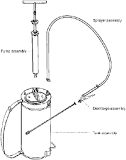Farmers often spray pesticides on their fields, which can produce strong odors. These chemicals are essential for protecting crops from pests, diseases, and weeds. The smell can vary depending on the type of pesticide used, but it’s usually noticeable right after application.
What Are Pesticides?
Pesticides are substances designed to control pests that threaten crops. They come in various forms, including:
Herbicides
- Used to kill unwanted plants and weeds.
- Essential for maintaining crop health and yield.
Insecticides
- Target insects that can damage crops.
- Help in controlling pests like aphids and beetles.
Fungicides
- Combat fungal diseases that can devastate crops.
- Important for preventing issues like potato blight.
Farmers apply these products through sprays, seed treatments, or pellets, depending on the specific need of the crop[4][5].
Why Do Farmers Use These Products?
The use of pesticides is crucial for several reasons:
Crop Protection
- They help ensure a healthy yield by controlling pests and diseases.
Food Supply
- With a growing global population, pesticides play a role in producing enough food efficiently. Without them, food prices could skyrocket by around 40%[5].
Environmental Management
- Surprisingly, using pesticides can lead to better environmental practices by reducing soil erosion and greenhouse gas emissions through less ploughing[5].
How Are Pesticides Regulated?
Pesticides are among the most regulated substances. Before they can be used, they undergo rigorous testing to ensure they don’t pose an unacceptable risk to human health or the environment[4][5]. Farmers must also keep detailed records of their pesticide use, which are checked by independent inspectors annually[5].
FAQ
Do farmers have to notify neighbors before spraying?
While it’s good practice for farmers to inform nearby residents before spraying pesticides, it’s not always a legal requirement. Some products may have specific regulations about notification, especially if aerial spraying is involved[1][3].
What happens if pesticides drift onto my property?
Farmers are required to take precautions to minimize drift when applying pesticides. If drift occurs and causes damage, it may be addressed through local regulations or discussions with the farmer[2][3].
Are pesticides harmful to health?
When used correctly according to guidelines, pesticides are designed to minimize risks. However, concerns about exposure do exist, which is why farmers must follow strict application protocols and safety measures[1][4].
How long do pesticide residues last on crops?
Pesticides break down over time. In the UK, food safety agencies monitor for residues, ensuring they remain at safe levels. Most produce tested shows no detectable residues at all[5][6].
In summary, while the smell of pesticides can be off-putting, they serve a vital role in modern agriculture by protecting crops and ensuring food security. Understanding their use and regulation helps demystify their presence in farming practices.







